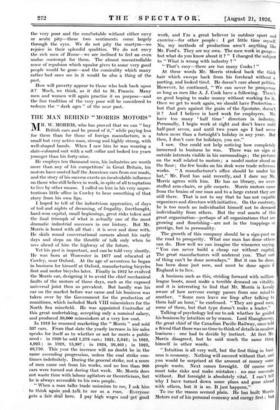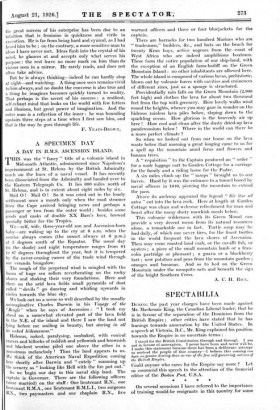THE MAN BEHIND "MORRIS MOTORS
MR. W. MORRIS, who has proved that we can `,` buy British cars and be proud of it," while paying less for them than for those of foreign manufacture, is a small but very active man, stiong and highly strung, with well-shaped hands. When I saw him he was wearing a slate-coloured suit with a soft collar and looked ten years younger than his forty-nine.
He employs ten thousand men, his industries are worth more than any of his competitors' in Great Britain, his motors have ousted half the American cars from our roads, and the story of his success exerts an incalculable influence on those who still believe in work, in spite of all temptation to live by other means. I called on him in his very unpre- tentious little office in Cowley to hear something of that story from his own lips.
I hoped to tell of the industrious apprentice, of days of toil and nights of dreaming, of frugality, forethought, hard-won capital, small beginnings, great risks taken and the final triumph of what is actually one of the most dramatic industrial successes in our history. But Mr. Morris is bored with all that : it is over and done with. He skids round conversational corners about his early days and steps on the throttle of talk only when he sees ahead of him the highway of the future.
Yet his past is important, and can be told very shortly. He was born at Worcester in 1877 and educated at Cowley, near Oxford. At the age of seventeen he began in business for himself at Oxford, manufacturing bicycles first and motor bicycles later. Finally in 1912 he evolved the Morris car, designing it to avoid the chief mechanical faults of the motors of those days, such as the exposed universal joint then so prevalent. But hardly was his car on the market before war came and his business was taken over by the Government for the production of munitions, which included Mark VIII minesinkers for the North Sea minefield. He was appointed Controller of this great undertaking, accepting only a nominal salary, and produced 50,000 minesinkers at a very low cost.
In 1919 he resumed marketing the " Morris " and sold 337 cars. From that date the yearly increase in his sales speaks for itself as to whether or not he meets a public need.: in 1920 he sold 1,278 cars; 1921, 2,942; in 1922, 4,925; in 1923, 15,987; in 1924, 26,401; in 1925, 49,750. This year the increase will no doubt be in the same ascending progression-, unless the coal strike con- tinues indefinitely. During the general strike, not a score of men came out from his works, and no less than 900 cars were turned out during that week. Mr. Morris does not waste time with labour agitators or theoreticians, but he is always accessible to his own people.
"When a man talks trade unionism to me, I ask him to think again :and -._taik to me • as. a man. Everyone gets a fair. deal here. I pay high wages 'tuid-get good work, and I'm a great believer in outdoor sport and exereise--fOr other people : I get little time myself. No, my 'methods of production aren't anything like Mr. Ford's.' They are my own. The men work in gang. butwhat do you know about it ? " I changed the subject to "What is wrong with industry ? "
"That's easy—there are too many Cooks ! "
At these words Mr. Morris stroked back the thick hair which sweeps back from his forehead without a parting, and looked tired. He doesn't care about politics. However, he continued, "We can never be prosperous so long as men like A. J. Cook have a following. There's no good hoping to make money without working for it. Once we get to work again, we should have Protection— but that goes against the grain of the Spectator, doesn't it ? And I believe in hard work for employers. We have too many 'half time' directors in industry. Personally, I begin work at eight and don't leave until half-past seven, and until two years ago I had never taken more than a fortnight's holiday in any year. But then, I don't care for holidays, you see."
I saw. One could not help noticing how completely immersed in business he was. There was no sign of outside interests visible in his surroundings ; the pictures on the wall related to motors ; a model motor stood on the floor ; the few bears on his desk were trade reference works. "A manufacturer's office should be under his hat," Mr. Ford has said recently, and I dare say Mr. Morris agrees with him. He has no library, no over- stuffed arm-chairs, or pile carpets. Morris motors came from the brains of one man and to a large extent they are still there. That is not to say that he has not capable organizers and directors with initiative. On the contrary, he is too much an individualist himself not to demand individuality from others. But the real assets of this great organization—perhaps of all organizations that arc growing and flourishing—are not in the trappings or prestige, but in personality.
The growth of this company should be a sign-post on the road to prosperity. What one man has done others can do. How well we can imagine the wiseacres saying, "You can never build a cheap car without capital. The great manufacturers will undercut you. That sort of thing can't be done nowadays." But it can be done, has been done just now, and must be done again if England is to live.
A business such as this, striding forward with million' league boots, must make a terrible demand on vitality, and it is interesting to find that Mr. Morris is keenly aware of how nervous energy passes from one mind to .another., `.` Some men leave me limp after talking to them half an hour," he confessed. "..They are good men, some of them, but that type doesn't make a leader." Talking of psychology led me to ask whether he guided his business by intuition or by reason. Lord Shaughnessy, the great chief of the Canadian Pacific Railway, once told a friend that there was no time to think of details in modem business: one had to decide by instinct. At first Mr. Morris disagreed, but he said much the same thing himself in other words.
". Intuition is all very well, but the first thing in busi. ness is economy. Nothing will succeed without that, and you would be surprised at the amount of money some people waste. Next comes foresight. Of course one must take risks and make mistakes : no one succeeds without, But foresight is absolutely vital. I can't tell why I have turned down some plans and gone ahead with others, but it is so. It just happens." To me the reason seemed plain. He has built Morris Motors out of his personal economy and energy first : but the great success of his enterprise has been due to an intuition that is feminine in quickness and virile in execution. He is far from being hard and cynical, as I had heard him to be ; on the contrary, a more sensitive man to ideas I have never met. Ideas flash into the crystal of his mind, he glances at and accepts only what Serves his purpose : the rest leave no more mark on him than do visions seen in a mirror. He rarely reads, and does not often take advice... But he is always thinking—indeed he can hardly stop at night—and watching. A thing once seen remains vivid to him always, and no doubt the converse is also true and a thing he .imagines becomes quickly turned to reality. That perhaps is the secret of his success : a resilient, self-reliant mind that looks on the world with few fetters and illusions, but great power of imagination. And the outer man is a reflection of the inner : he was bounding upstairs three steps at a time when I first saw him, and that is the way he goes through life.
F. YEATS-BROWN.
. .



































 Previous page
Previous page